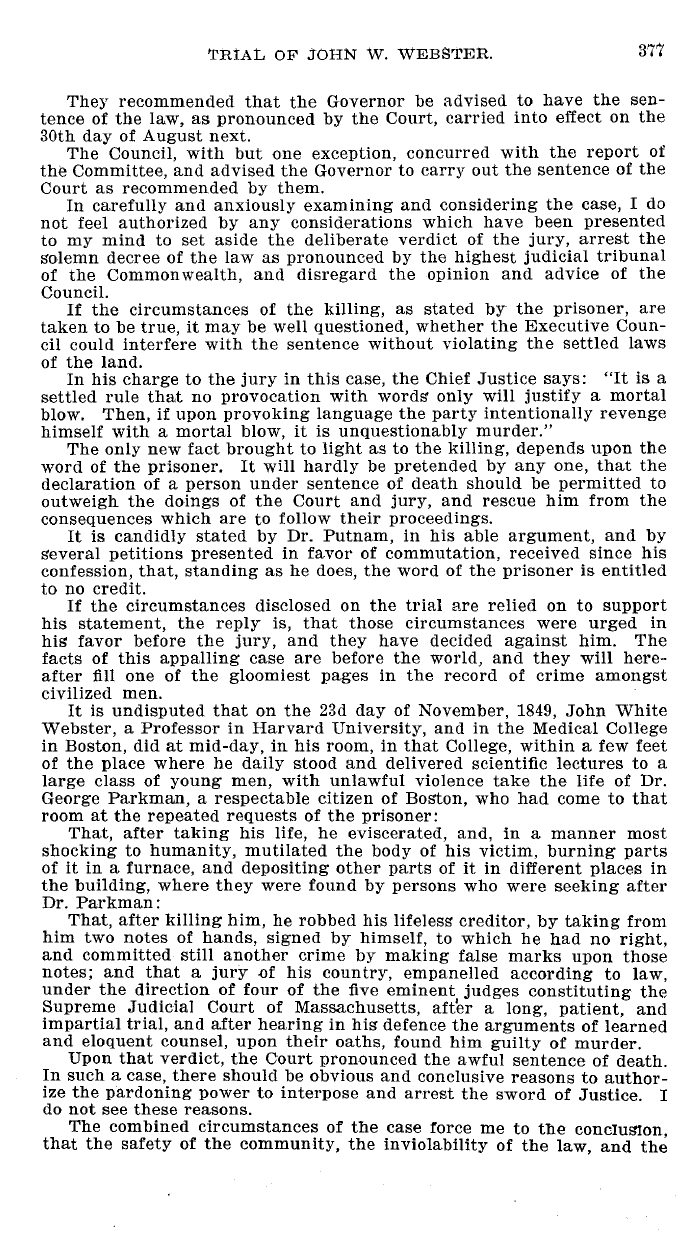|
TRIAL OF JOHN W. WEBSTER. 3'77
They recommended that the Governor be advised to have the sen-
tence of the law, as pronounced by the Court, carried into effect on the
30th day of August next.
The Council, with but one exception, concurred with the report of
the Committee, and advised the Governor to carry out the sentence of the
Court as recommended by them.
In carefully and anxiously examining and considering the case, I do
not feel authorized by any considerations which have been presented
to my mind to set aside the deliberate verdict of the jury, arrest the
solemn decree of the law as pronounced by the highest judicial tribunal
of the Commonwealth, and disregard the opinion and advice of the
Council.
If the circumstances of the killing, as stated by the prisoner, are
taken to be true, it may be well questioned, whether the Executive Coun-
cil could interfere with the sentence without violating the settled laws
of the land.
In his charge to the jury in this case, the Chief Justice says: "It is a
settled rule that no provocation with words only will justify a mortal
blow. Then, if upon provoking language the party intentionally revenge
himself with a mortal blow, it is unquestionably murder."
The only new fact brought to light as to the killing, depends upon the
word of the prisoner. It will hardly be pretended by any one, that the
declaration of a person under sentence of death should be permitted to
outweigh the doings of the Court and jury, and rescue him from the
consequences which are to follow their proceedings.
It is candidly stated by Dr. Putnam, in his able argument, and by
several petitions presented in favor of commutation, received since his
confession, that, standing as he does, the word of the prisoner is entitled
to no credit.
If the circumstances disclosed on the trial are relied on to support
his statement, the reply is, that those circumstances were urged in
his favor before the jury, and they have decided against him. The
facts of this appalling case are before the world, and they will here-
after fill one of the gloomiest pages in the record of crime amongst
civilized men.
It is undisputed that on the 23d day of November, 1849, John White
Webster, a Professor in Harvard University, and in the Medical College
in Boston, did at mid-day, in his room, in that College, within a few feet
of the place where he daily stood and delivered scientific lectures to a
large class of young men, with unlawful violence take the life of Dr.
George Parkman, a respectable citizen of Boston, who had come to that
room at the repeated requests of the prisoner:
That, after taking his life, he eviscerated, and, in a manner most
shocking to humanity, mutilated the body of his victim, burning parts
of it in a furnace, and depositing other parts of it in different places in
the building, where they were found by persons who were seeking after
Dr. Parkman:
That, after killing him, he robbed his lifeless creditor, by taking from
him two notes of hands, signed by himself, to which he had no right,
and committed still another crime by making false marks upon those
notes; and that a jury of his country, empanelled according to law,
under the direction of four of the five eminent judges constituting the
Supreme Judicial Court of Massachusetts, after a long, patient, and
impartial trial, and after hearing in his defence the arguments of learned
and eloquent counsel, upon their oaths, found him guilty of murder.
Upon that verdict, the Court pronounced the awful sentence of death.
In such a case, there should be obvious and conclusive reasons to author-
ize the pardoning power to interpose and arrest the sword of Justice. I
do not see these reasons.
The combined circumstances of the case force me to the concluslon,
that the safety of the community, the inviolability of the law, and the
|

